Phoenix: About "love", reality is more cruel than movies.

Text | Wang Zhongyang lp
Looking at it now, "China-Japan co-production" seems to be much more reliable than "China-US co-production".
In the "ancient times", there was Dunhuang, and later there was Phoenix. Although the front part was not very popular because of the age limit, the story and artistry were quite high.
The latter film once set up a "prison" in Bayi Film Studio, which was used to shoot most of the scenes in the film. Of course, it was not well-known because of its "literary" atmosphere. Although the organizing committee of Tokyo Film Festival (2007) spoke highly of this film:
"Phoenix is the representative work of the sixth generation directors in China, and it has reached and surpassed the level of the fifth generation directors to a great extent."
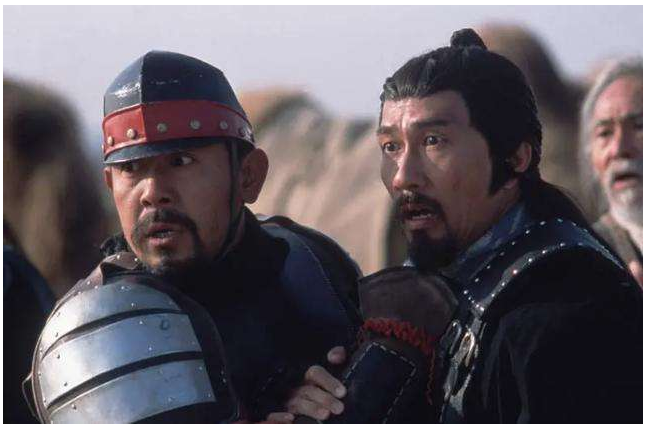
The actor is Nakai Kichi, who once collaborated with Jiang Wen in Heroes of Heaven and Earth. At that time, the media once called him "Japanese Chen Daoming". At first glance, it really looks like him. He has made four films in China, namely Heroes of Heaven and Earth, Riding Alone for a Thousand Miles, The Warring States, and this Phoenix. He is the only leading actor and one of the producers.
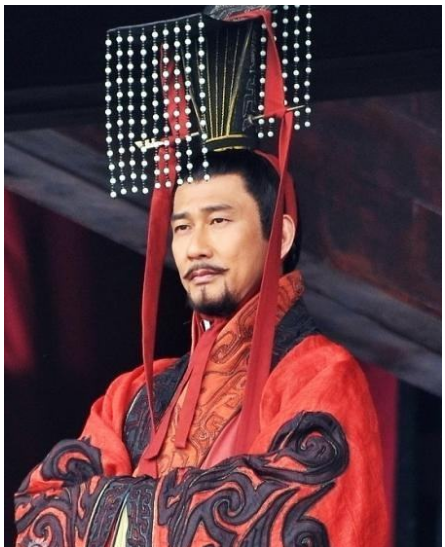
If the core of Phoenix is summarized in one sentence, the tone of literary point can be:
"You are so close to me, but you are so far away."
To put it bluntly:
"It’s hard to have a lover."
You can say "melodramatic" or "sorry". After reading it, you often feel like being scratched by a small claw in your heart. At first, you scratch it gently, and suddenly you come hard when you are unprepared. When you feel pain, the claw disappears long ago, leaving you alone to relive a kind of pain.
So after watching Phoenix, there are probably only three things:
First, sigh;
Second, sigh;
Third, it is still a special sigh.
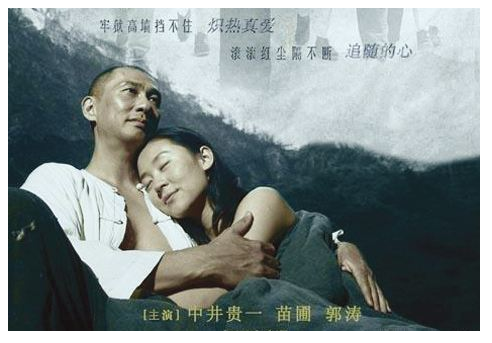
one
Sigh, men suffer in vain.
Here, I would like to say that Japanese movies have always grasped and described the "missing" and "dying beauty" in a very good way. From the well-known Love Letter to the later "Hello, China", the audience can always GET "the regret at that moment is eternal", and there is no other explanation for this except the unique cultural aesthetics of the island country.
The setting of the male actor Liu Lang (Nakai Kichi) in the film is very interesting:
At the end of the Qing Dynasty and the beginning of the Republic of China, orphans in Northeast China and Japan were raised by Chinese since childhood, and they didn’t explain much to their biological parents and families. I only know that he was brought up by Chinese, so he can’t speak Japanese. Although he talks in Chinese throughout the movie, even if there is a feeling that "I am obviously Japanese", I have to say that a Japanese actor can play a role in Chinese all the time, which is worthy of respect.

The story takes place in the early years of the Republic of China. Liu Lang has a girlfriend who hasn’t gone through the door. One day, two people go to the theatre together. During the watching process, her girlfriend is harassed by a bully. People don’t want to avoid touching her daughter. They touch her twice and let her go. When she touches her three times, she is anxious and looks back at him. At this time, Liu Lang also looked back in hindsight, and the camera paused in the embarrassment of three people. Then the bully screamed and fell to the ground-
His leg was amputated by Liu Lang.
It can be seen that at all times and all over the world, any bloody person has always been a killer of "smelly hooligans". Only this time Liu Lang laid hands on him too hard, so he was put in jail.
There is a scene in prison that shows Nakai Kichi’s performance skills:
When he first entered the prison, Liu Lang was embarrassed by a group of prison tyrants. He put down his simple bags and stood with his face slightly sideways. The sun shone on his face through the fence outside the window. For a moment, it was quite "coming to live" (Japanese samurai in Heroes of Heaven and Earth).
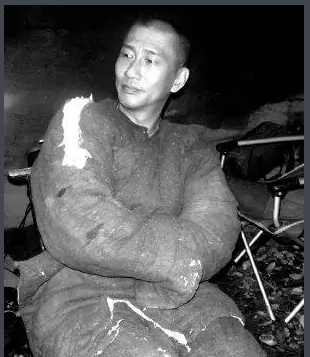
Then he was beaten up by the Weiou without saying a word. Until midnight, Liu Lang rolled over and got up, grabbed the guy and slammed him on the head of the sleeping prison bully. The other party snorted and nothing happened. Liu Lang went back and went to sleep …
The two scenes of beating hooligans and jailers highlight the character of the male master-
Can do it and try not to make any noise.
People like this are basically accessible at ordinary times. They are not good at words but have a clear mind. They have their own way of dealing with people and things, and most of them are extremely emotional.
This kind of character shaping also determines the romance and regret of Phoenix later.
two
It’s hard to make a pair with two sighs
I’m afraid the screenwriter and director blame the man for not being miserable enough, so they arranged for the bully outside the prison to spoil his girlfriend while he was in prison, and the woman committed suicide in anger.
Then this "dust-filled gourd" began to suppress big moves, vowing to go out and kill for revenge. After several unsuccessful escapes, the sentence was aggravated.
At this time, in another parallel line of the story, Hong Zhou (nursery decoration) went to prison because she couldn’t bear her husband’s humiliation and murder, and because she was pregnant to avoid capital punishment. This character setting for the female host also laid the foundation for two people to fall in love at the beginning-
Are passive counterattack, are "have to" bad karma people.
The so-called "if you want to look down on life and death, only love will accompany you."
Both of them have hatred in their hearts, but they meet (men and women are mixed) in prison. The only chance to see each other every day is when they are outdoors and when they listen to the radio with the prisoners.
Close at hand, a look, an action from indifference to implication.
Far away in the end of the world, a cliff fall, an oath from this life to forever.
Among them, although the film provided countless coincidences and even deliberately for their acquaintance, the gradual sublimation of their feelings was indeed arranged naturally. Someone once said, how can this feeling that men and women are separated and occasionally seen in prison last?
As everyone knows, this is precisely the wonderful work of Phoenix, because there is a saying:
"Emotional things, who can tell?"
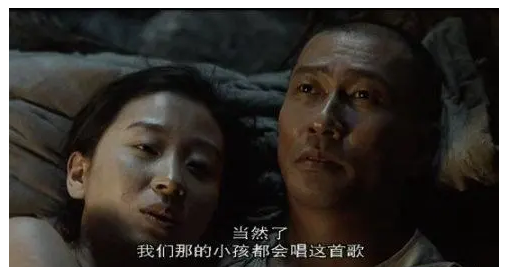
I only remember that Tomb-Sweeping Day, who sat snuggled up on the haystack, folded the paper boat and made a wish:
"Let the people who have hurt us before and the people we have hurt follow this boat together to find happiness."
The boat is swaying on the gurgling stream with their smiles. Maybe they can really find happiness. It’s just that in troubled times, warlords, restoration, anti-Japanese and liberation have been rolling all the way for decades. Just because of this, we don’t waste an hour and a half watching it.
And the last shot, it can be called amazing:
On a gray winter’s day, the woman in the red shirt I met on the street corner looked crisp, like "red mud and a little snow" written by the ancients.
Director Jin Chen was once asked:
Why do you want to arrange the ending of the hero and heroine in the play "thirty-five years later, they finally reunited and died in a cold lake"? He told the fact that the two prototypes in reality had divorced:
"I heard that they broke up some time ago and I was surprised. But this is real life, and love is relatively vacuum. I don’t want the hero and heroine to develop any further, so let them end up in the best feeling. "
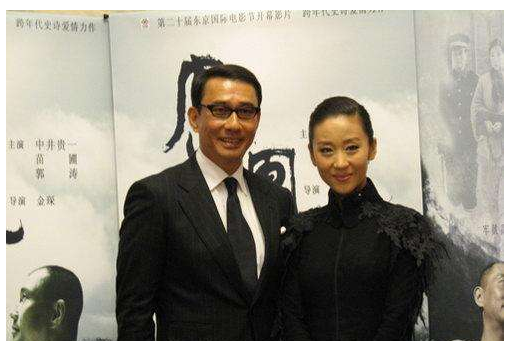
As an audience, seeing this time is quite complicated. As mentioned above, although the main body of this film is operated by China filmmakers, the ideas and artistic conception are more in line with the praise of Japanese films for "regret" and the prayers beyond praise. When this wish is projected in Phoenix:
Liu Lang cut her hair braids, and two meters beside her, Hong Zhou stood there laughing with everyone, flaunting herself like a wild rose in full bloom. As the camera zoomed in, Liu Lang held his cut braid and smiled.
The camera shakes, freezes, and ends.
Just like Sweet Honey, the lens of history recorded their first meeting.
Be a love love love. Two meters away, the two men walked all their lives.

three
Three sighing phoenix will never seek to burn.
In the film, a fortune teller once said to two people:
"You will be together. You are all doomed."
The film finally arranged for them to "live forever" in the water, which also coincided with this sentence, which made it even more sad.
When two people were close at hand, the ice suddenly broke. Liu Lang suddenly fell into the ice hole. As an audience worried about him, Zhou Hong made their love nirvana with a cry-
She jumped in depth. Under the ice, in the cold river, two people held each other’s hands last.
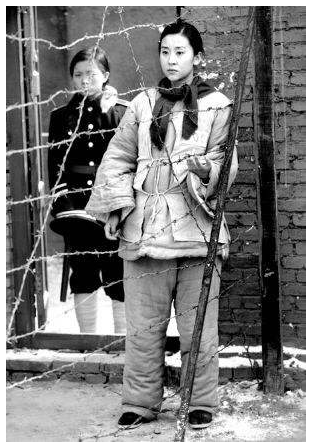
Without a good beginning, there is also no good ending, but let love sublimate into real love without utility.
"Love melts hatred" is another idea in Phoenix. For example, Liu Lang always wanted to get out of prison in order to kill the rogue who abused his girlfriend. Decades later, he was released from prison, and he wanted to take revenge with a knife. But when he saw that the former "hooligan" was as old as him and his children and grandchildren were full, he stood outside and hesitated for a long time and finally gave up.
"Meet a smile and forget a thousand enemies." Leaving only the "old man" who looked at the knife on the ground with a puzzled face.
Of course, this is just a family statement.
In addition, the time that accompanied Phoenix is also very meaningful:
From Beiyang government to Northeast China, from right to puppet Manchuria, from party-state government to liberation war …
The two protagonists spent the most youthful years in prison. These times are just backgrounds, and no matter how they change, it seems that they have little to do with them. They didn’t get much kindness for it. I appreciate this way of dealing with movies, so the director’s handling also shows a kind of ideological progress and maturity.
Here, I want to boast that the soundtrack of the whole film can be regarded as an excellent work. The style is cold and clean, and the film is a little more lively when it is mixed with gloomy snowy days and dark and colorless prisons.

As an unpopular romantic literary film, I only praise the story told by people in those days. Today, when it comes to Phoenix, my mind is still that memorable poster:
Under the moon, barren hills and cliffs are accompanied.
The two men left their side faces to me and looked up at the cold moon in the sky together.
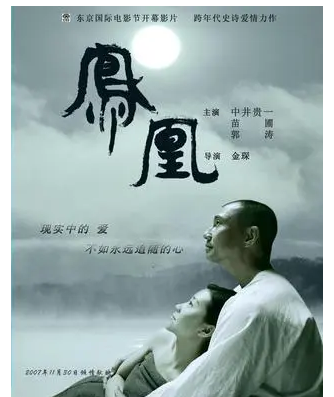
"After a farewell, two lovesickness. Just say March and April, but who knows five or six years. The lyre has no intention of playing, and the eight-character script has no biography. The nine-ring chain is broken from it, and the ten-mile pavilion is eager to wear. "
The woman hummed, as if she had foretold fate from the beginning.
?
